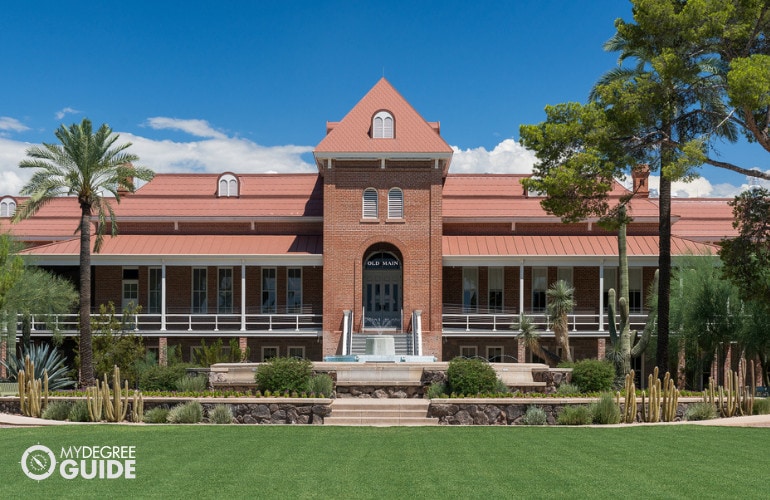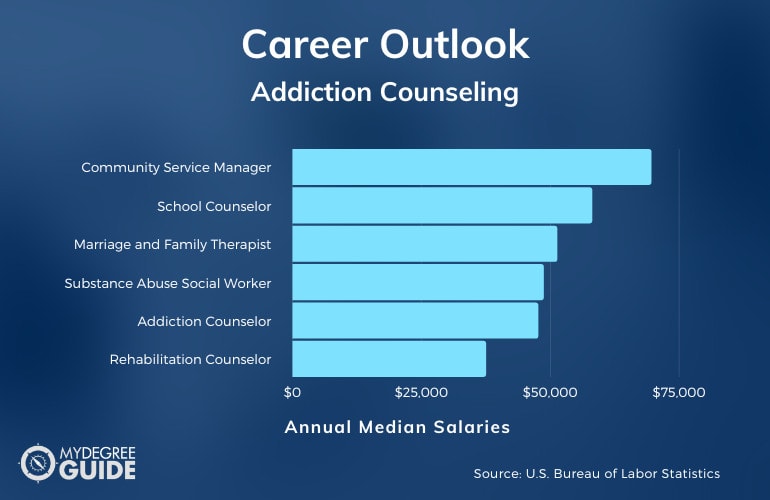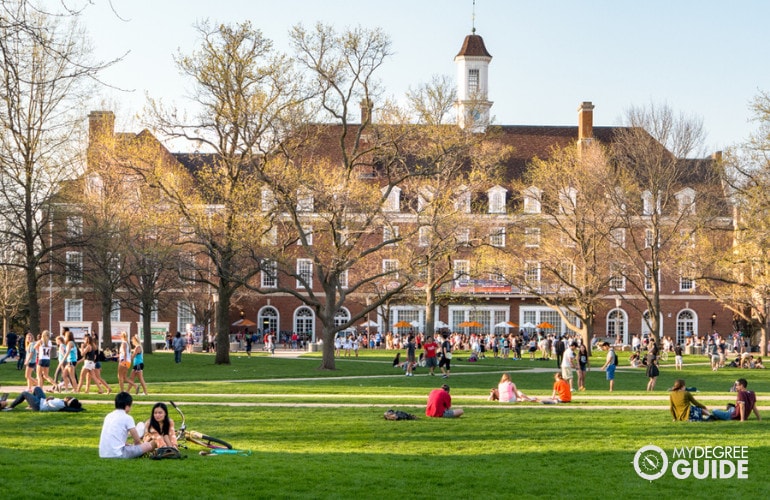We’ve identified 30 accredited Masters in Addiction Counseling Online programs for 2024. Want a career helping people? Start here!

Addiction affects people from all walks of life. When addiction takes hold, it doesn’t matter if the afflicted person is male or female, young or old, rich or poor: Help is a must. Without intervention, the person may continue to spiral downward.
Editorial Listing ShortCode:
As an addiction counselor, you can help pull people from the grip of addictions. A career in this growing field can give you opportunities to work with diverse populations and make a real difference in people’s lives. To become a licensed substance abuse counselor, you should take online classes for a master’s degree in addiction counseling.
Your graduate studies can help prepare you for a rewarding counseling career among people who truly need your help.
Universities Offering Online Masters in Substance Abuse Counseling Degree Programs
Methodology: The following school list is in alphabetical order. To be included, a college or university must be regionally accredited and offer degree programs online or in a hybrid format.
1. Arizona State University
Arizona State University offers an online program for a Master of Science in Addiction Psychology. To graduate, students must complete 15 courses, including Addiction and Substance Abuse: Assessment and Diagnosis, Psychopharmacology, and more. Each class is 7.5 weeks long. Students must also participate in a practicum.
Arizona State University is accredited by the Higher Learning Commission.
2. Assumption College
Assumption College in Worcester, Massachusetts is a private, liberal arts college with an annual enrollment of about 2,000 undergraduates. This Roman Catholic school has applied for university status with its application currently under review.
The college was founded in 1904 by the Catholic order Augustinians of the Assumption. The original campus was located on a tract of hillside land in Greendale, Worcester. In 1956, the school relocated to Salisbury Street located on the west side of the city. The college’s athletic team is called the Greyhounds and competes in the NCAA Division II – Northeast 10.
- Master’s in Rehabilitation Counseling
Assumption College is accredited by the New England Commission of Higher Education.
3. Bethel University
Based in Mishawaka, Indiana, Bethel University is affiliated with the Christian Missionary Church. This private liberal arts university was founded in 1947. It has around 1,100 undergraduate students and 500 graduate students.
The university is part of the National Association of Intercollegiate Athletics (NAIA) with its teams called the Pilots. Its basketball team competes in the NAIA Division II and Crossroads Leagues. It also participates in the National Christian College Athletic Association. Aside from participating in athletic competitions, university athletes are encouraged to undertake short-term missionary work.
- Online Master’s in Counseling – Addictions Counseling
Bethel is regionally accredited by The Higher Learning Commission.
4. California Southern University
California Southern University is a private university based in Costa Mesa, California. Established in 1978, the university started out as a correspondence school offering associate-level programs. In the 90s, it added distance learning programs. Today, it is now a leading online degree-granting institution.
- Online Master’s in Psychology – Advanced Addiction Studies
CalSouthern is accredited by the WASC Senior College and University Commission.
5. Cambridge College
Boston Massachusetts has been home to a prestigious Cambridge College, a private academy, since 1971. With four other campuses around the country, Cambridge has expounded upon its distance learning programs to award students with undergraduate and graduate degrees, including doctoral programs face to face or online. Psychology, healthcare, and education are a few of the examples of favored degrees at CC.
- Master’s in Addiction Counseling
Cambridge College is accredited by the New England Commission of Higher Education.
6. Capella University
Minneapolis, Minnesota-based Capella University is an online university owned by Strategic Education, Inc. It recently added learning sites in Orlando, FL and Atlanta, GA.
It was founded as The Graduate School of America in 1993 with Dr. Harold Abel as its first president. Four years later, it received regional accreditation. In 2006, it became a publicly traded company. An estimated 38,000 students are enrolled in the University, which has a faculty of 207 full-time instructors and some 1,300 part-time instructors.
- Master’s in Addiction Studies
Capella is accredited by the Higher Learning Commission.
7. Carlow University
Carlow University is a private Catholic university located in Pittsburgh, PA. This co-educational school was founded by the Sisters of Mercy in 1929 almost 90 years after the congregation arrived in Pittsburgh.
It was first known as Mount Mercy College. Its name was changed to Carlow College in 1969. In 2004, it officially became Carlow University. The majority of the students are women (84%). The university’s athletic teams are called the Celtics, reflective of the Irish heritage of the university. It competes in the National Association of Intercollegiate Athletics and the United States Collegiate Athletic Association.
- Master’s in Professional Counseling – Addictions Counseling
Carlow is accredited by the Middle States Commission on Higher Education.
8. Drexel University
Drexel University is a private university located in Philadelphia, PA. Founded in 1891 by philanthropist Anthony Drexel, it was first known as Drexel Institute of Art, Science, and Industry. In 1936, it was renamed Drexel Institute of Technology and later, Drexel University in 1970.
The school mascot of Drexel University is a dragon named “Mario the Magnificent.” The mascot was named in honor of alumnus Mario V. Mascioli. Its athletic teams compete in the NCAA Division I.
- Master’s in Addictions Counseling
Drexel is regionally accredited by the Middle States Commission on Higher Education.
9. Emporia State University
Emporia State University, or ESU is the third oldest public university in Kansas. Established in 1863, it is also one of six public universities under the governance of the Kansas Board of Regents.
In 1923, the school’s name was changed to the Kansas State Teachers College. In 1974, it was changed to Emporia Kansas State College. Three years later, it was named Emporia State University. The intercollegiate athletic teams are called the Hornets and Lady Hornets. It participates in the NCAA Division II and Mid-America Intercollegiate Athletics Association.
- Master’s in Clinical Counseling – Addiction Counseling
Emporia State is accredited by the Higher Learning Commission.
10. Governors State University
Governors State University is a public university established in 1969. Located in University Park, Illinois, it was one of the first universities to offer online classes.
In place of grades, it offered competencies. It also had interdisciplinary studies in lieu of departments. All professors held the rank of University Professor. The school is located about 30 miles south of Chicago. The university’s athletic teams, the Jaguars, compete in the National Association of Intercollegiate Athletics.
- Master’s in Addictions Studies
GSU is accredited by the Higher Learning Commission of the North Central Association of Colleges and Schools.
11. Grand Canyon University
Grand Canyon State University is one of the largest Christian universities in the world, with around 20,000 attending on campus and another 70,000 students taking online courses. It is based in Phoenix, Arizona.
It was established in 1949 by the Arizona Southern Baptist Convention as Grand Canyon College. In 2004, it was sold to Significant Education, LLC and became the pioneer for Christian college in the US. The university’s athletic teams are called the Antelopes. It participates in the NCAA Division I.
- Master’s in Addiction Counseling
- Master’s in Christian Counseling of Substance Use and Addictive Disorders
GCU is regionally accredited by the Higher Learning Commission (HLC).
12. Hazelden Betty Ford Graduate School of Addiction Studies
A non-profit organization for healing individuals affected by alcohol and drug addiction, the Hazelden Betty Ford Graduate School of Addiction Studies is based in Center City, Minnesota. It was established in 1949. In 2014, it merged with the California-based Betty Ford Center to become the leading non-profit addiction treatment provider in the United States.
- Master’s in Addiction Counseling
The Hazelden Betty Ford Graduate School of Addiction Studies is accredited by the Higher Learning Commission.
13. Indiana Wesleyan University
The largest private university in the state of Indiana, Indiana Wesleyan University has headquarters in Marion, Indiana. It was first known as Marion Normal College before it was given its current name. It had more than 14,000 students in 2017.
A member of the National Association of Intercollegiate Athletics, the Indiana Wesleyan University calls its athletics teams the Wildcats.
- Master’s in Counseling – Clinical Addictions Counseling
IWU is accredited by The Higher Learning Commission and is a member of the North Central Association of Colleges and Schools.
14. Lancaster Bible College
Lancaster Bible College is based in Lancaster, Pennsylvania. It is a private Bible college and graduate school that offers non-credit courses along with undergraduate and master degree programs. This non-denominational college was established in 1933. It has close to 2,000 students.
The athletic teams of the college are called the Chargers. The university is a member of the National Christian College Athletic Association and the National Collegiate Athletic Association. It is also a member of the North Eastern Athletic Conference of the NCAA.
- Master’s in Addiction Counseling
LBC is accredited by the Middle States Commission on Higher Education.
15. Liberty University
A private evangelical Christian university based in Lynchburg, Virginia, the Liberty University has more than 110,000 students. It is one of the biggest private non-profit universities in the United States in terms of student enrollment. It consists of 17 colleges that include a school of law and a school of medicine.
It is known for its conservative Christian orientation. Bible studies are required for undergraduate students. Its honor code, “Liberty Way,” bans premarital sex as well as interactions between members of the opposite sex. Its athletic teams are known as the Liberty Flames. Its college football team is a member of the NCAA Division I – FBS, while its other sports teams take part in the Atlantic Sun Conference.
- Master’s in Addiction Counseling
Liberty is accredited by the Southern Association of Colleges and Schools Commission on Colleges.
16. Mid-America Christian University
Mid-America Christian University is based in Oklahoma City, Oklahoma. This private liberal arts college used to be known as the Gulf Coast Bible College with head offices in Houston, Texas. Its 62-acre campus accommodates more than 2,500 students.
Its athletic teams are known as the Evangels. They compete in the National Association of Intercollegiate Athletics and National Christian College Athletic Association.
- Master’s in Counseling – Addiction and Substance Abuse Counseling
Mid-America Christian University is accredited by the Higher Learning Commission (HLC).
17. Nova Southeastern University
Nova Southeastern University is based in Davie, Florida. This private university has more than 20,0000 students. It was established in 1965 as the Nova University of Advanced Technology; first offering graduate degrees in social sciences. It was merged in 1994 with the Southeastern University of the Health Sciences. Its athletic teams are called the NSU Sharks. They compete in the NCAA-Division II under the Sunshine State Conference.
- Master’s in Counseling – Substance Abuse Counseling
NSU is accredited by the Southern Association of Colleges and Schools Commission on Colleges.
18. Regent University
Regent University is based in Virginia Beach, Virginia. This private Christian university was founded in 1977 as the Christian Broadcasting Network University by Pat Robertson. In 1990, it changed its name to Regent University.
Aside from traditional on-campus programs, it offers online learning programs. The university has adapted the motto, “Christian Leadership to Change the World.” It has more than 8,000 students. Its athletic teams are known as the Royals.
- Master’s in Human Services – Addictions Counseling
Regent is accredited by the Southern Association of Colleges and Schools Commission on Colleges.
19. Thomas University
Located in Thomasville, GA, Thomas University is a non-profit educational institution. It was established in 1950 as the Birdwood Junior College. Classes started four years later with just nine students.
In 1956, the name of the school was changed to Thomas County Community College. In 2000, it gained university status. A member of the National Association of Intercollegiate Athletics, Thomas University uses Night Hawk as the nickname of its athletic teams.
- Master’s in Clinical Rehabilitation and Mental Health Counseling
Thomas University is accredited by the Southern Association of Colleges and Schools Commission on Colleges.
20. Union College
Union College is one of the oldest colleges in Barbourville, Kentucky. Established in 1879, it is affiliated with the United Methodist Church. Its 100-acre campus in Kentucky is home to 44% of its student population. It has more than 1,200 students.
Union College is a member of the National Association of Intercollegiate Athletics with its teams known as the Bulldogs and Lady Bulldogs.
- Master’s in Substance Abuse Counseling
Union College is accredited by the Southern Association of Colleges and Schools, Commission on Colleges.
21. University at Buffalo
The State University of New York at Buffalo, or simply the University of Buffalo, is the largest public university in New York. It has more than 31,000 students in 13 colleges.
Founded in 1846 as a medical college, it was merged with the State University of New York (SUNY) system in 1962. Numerous alumni and faculty members of the university have gone on to have illustrious and accomplished careers. Among them are US president Millard Fillmore and Somalian prime minister Mohamed Abdullahi Mohamed.
- Master’s in Rehabilitation Counseling
The University at Buffalo is regionally accredited by the Middle States Commission on Higher Education.
22. University of Massachusetts – Boston
The University of Massachusetts-Boston, or UMass Boston, is the only public university in Boston. It is an urban public research university that sits on a 120-acre property in the city of Boston, Massachusetts.
It was established in 1852 as the Boston State College. More than a century later, it was renamed the University of Massachusetts-Boston. The school’s athletic teams are known as the Beacons. They compete in the NCAA Division II.
- Master’s in Rehabilitation Counseling
UMass Boston is accredited by the Commission on Institutions of Higher Education of the New England Association of Schools and Colleges, Inc.
23. University of North Texas
The University of North Texas is located in Denton, Texas. It is a public research university established in 1890. It is the flagship educational institution of the University of North Texas System, which has universities in Fort Worth, Dallas, and Frisco. This nonsectarian and coeducation institution has nearly 40,000 students. The UNT athletic teams are called the Mean Green. The university participates in the NCAA Division 1.
- Master’s in Rehabilitation Counseling
UNT is accredited by the Southern Association of Colleges and Schools Commission on Colleges to award baccalaureate, master, and doctorate degrees.
24. University of South Dakota
The University of South Dakota was established in 1862, more than 20 years before the establishment of the state itself. It is a public coeducational research university located in Vermillion.
The flagship university in South Dakota has the sole law school and medical school in the state. It has produced notable alumni such as veteran American broadcaster Tom Brokaw, senators Tim Johnson, James Abourezk, Larry Pressler, and John Thune. Its athletic teams are nicknamed the Coyotes. It participates in the NCAA Division I.
- Master’s in Addiction Studies
Institutional accreditation by the Higher Learning Commission (HLC) provides assurance to prospective students, parents, and others that USD meets the agency’s clearly stated requirements and criteria.
25. University of the Cumberlands
A private, non-profit college, the University of the Cumberlands is located in Williamsburg, Kentucky. It was founded in 1888 by Baptist ministers. It used to be called Cumberland College until 2005, when it was elevated to university status.
It provides advanced liberal arts education with Christian values to more than 13,000 students per year. Its athletic teams are known as the Patriots. The school competes in the Mid-South Conference of the National Association of Intercollegiate Athletics.
- Master’s in Addiction Counseling
UC is accredited by the Southern Association of Colleges and Schools Commission on Colleges.
26. Virginia Commonwealth University
Founded in 1838, the Virginia Commonwealth University is public research university located in Richmond, VA. In the beginning, it was the medical department of the men’s liberal art college, Hampden-Sydney College.
In 1854, it became the Medical College of Virginia. It was merged with the Richmond Professional Institute in 1917. It now has more than 31,000 students enrolled in its 11 schools and three colleges. It is a member of the NCAA Division III with its athletic teams called the Tigers. Its rivalry with Randolph-Macon College is considered one of the most fabled college rivalries in the US.
- Master’s in Addiction Studies
VCU is accredited by the Southern Association of Colleges and Schools Commission on Colleges.
27. Walden University
Walden University is an online university with head offices in Minneapolis, Minnesota. It is part of a worldwide network of universities under the management of Laureate Education, Inc. It offers undergraduate as well as graduate degrees.
It was established in 1970 by New York teachers Bernie and Rita Turner. In 1971, the first classes in Naples, Florida took place. The university conferred its first degrees in 1972. In 1995, it became the first school to offer an online master’s program in education.
- Master’s in Clinical Mental Health Counseling – Addiction Counseling
Walden has been accredited by The Higher Learning Commission (HLC) since 1990.
28. Washburn University
Washburn University is located in Topeka, Kansas. It is a co-educational public institution offering undergraduate, graduate, and professional programs.
The school traces its roots to Lincoln College, which was established in February 1965 through a charter by the state of Kansas. It was renamed Washburn College in 1868. The athletic teams of the school are called the Ichabods in honor of its first benefactor, Ichabod Washburn. The school competes in the NCAA Division II.
- Master’s in Human Services/Addictions Counseling
Washburn is accredited by the Higher Learning Commission.
29. West Virginia University
West Virginia University is a public, research-intensive university, with its main campus located in Morgantown, West Virginia. It also has campuses in Beckley, Kyser, and Charleston, West Virginia.
The school traces its roots to the Agricultural College of West Virginia, which was established in 1867. It was renamed to West Virginia University in 1868. Its athletic teams are called the Mountaineers, competing in the NCAA Division I. One of its most notable graduates is Jerry West, a basketball Hall of Famer and current basketball executive.
- Master’s in Clinical Rehabilitation & Mental Health Counseling
WVU is accredited by the Higher Learning Commission, which guarantees the quality of the university as a whole.
30. Wright State University
Wright State University has its main campus in Dayton, Ohio and a branch campus on Grand Lake St. Marys. It was founded in 1964 as a branch campus of the Ohio State University and the Miami University.
In 1965, legislation was approved that transformed it into a separate institution. In 1967, it became officially known as Wright State University. Its athletic teams are called the Wright State Raiders. It participates in the NCAA Division I.
- Master’s in Rehabilitation Counseling – Addiction Counseling
Wright State is accredited by the Higher Learning Commission (HLC).
Master’s in Substance Abuse Counseling Programs
Many people who earn a master’s in addiction counseling choose to pursue jobs as counselors.
Click on the field that most interests you to jump to that section of the guide:
- Addiction Counselor
- Community Services Manager
- Marriage and Family Therapist
- Rehabilitation Counselor
- School Counselor
- Substance Abuse Social Worker
People in each of these specializations play an important role in helping people fight and recover from their addictions.
Addiction Counselor

Addiction counselors apply treatment strategies to help people recover from their substance abuse disorders. They also help to educate families on what their loved one is struggling with and how to support them through recovery and adopting a new lifestyle of living without addictions.
To specialize as a mental health counselor, you’ll need to learn about the physical and psychological effects of commonly abused substances as well as why people turn to these substances. Studies in addiction counseling focus on how to redirect people away from these outlets to live a more successful and healthy life.
Editorial Listing ShortCode:
After graduation, you could pursue work at a rehabilitation center, halfway house, juvenile detention center or prison, a hospital, or private practice. You might also specialize in a particular type of addiction, such as alcoholism, and licensure may be required in your state.
You’ll likely work closely with physicians, parole and probation officers, social workers, school counselors, and clergy members as you track a client’s progress and refer them to other members of a support team.
Community Services Manager

If you’d like to work more behind the scenes in an organization, you might consider being a Community Services Manager. In this administrative position, you might oversee community programs like support groups for addicted people and their loved ones.
You could work a government agency or a non-profit organization to run the business side of your workplace. You’ll likely oversee program staff, direct program implementation, and set the budget for new initiatives, as well as evaluating their effectiveness.
Editorial Listing ShortCode:
Other job responsibilities might include teaching drug prevention classes, raising funds, and offering activities to keep teens off the streets. If you think you would enjoy managing an organization that makes a real difference in the community, this could be the educational path for you.
Marriage and Family Therapist

When one person in a family has a substance abuse problem, it affects everyone. You could use your counseling skills to help people work through their addictions while also improving their relationships.
To specialize as a counselor in this field, you’ll need to learn about the dynamics of romantic and familial relationships and how the stresses of those relationships can affect a person’s mental health and life choices. You’ll also need to learn how partners and families can support their loved one as they recover from and resist their temptations to abuse drugs or alcohol.
Editorial Listing ShortCode:
Studies for this specialization focus on counseling techniques for partner and group sessions as well as human behavior analysis and coping mechanisms. You must be licensed to work as a marriage and family therapist. Afterward, you could pursue work at a community organization, a Christian counseling agency, or a private counseling practice.
Rehabilitation Counselor

As a rehabilitation counselor, you can help people develop the skills to live independently without falling into drug-abuse patterns.
Rehabilitation counselors counsel people through emotional dependencies and help them to identify any barriers to overcoming their addictions. They also consult with and refer clients to other members of the support team, such as physicians, clergy members, and job counselors.
Editorial Listing ShortCode:
With this degree, you may find work in a rehab facility, a halfway house where people live after completing an in-patient rehab program, or as a member of a community agency or private practice counseling people as they continue on their journey. In many ways, you can be the person standing by your client’s side as they take steps to resume a normal, healthier life.
School Counselor

A school setting can be a great choice if you’re interested in working with addicted youths. Drugs and alcohol are tempting substances to many students for a variety of reasons, from family influences to stress to recreational activities.
You can become a safe, listening ear and an observant presence in students’ lives. School counselors work closely with teachers, school administrators, and parents. If a student has had trouble with the law, they may also consult with probation officers and the court system.
Editorial Listing ShortCode:
To specialize in this field, you’ll need to learn how to counsel students and what your responsibilities are for referring certain matters to parents and other community authorities. You’ll also need to learn techniques to help recovering students resume a successful school career.
In addition to counseling children and teens about substance abuse, you may also help them talk through personal problems and career choices. If you enjoy working with students, this can be a very rewarding career.
Substance Abuse Social Worker

As a social worker, you could be a caseworker for people with addictions. With training and licensure, you could provide addiction counseling services as a licensed clinical social worker in a mental health clinic or a rehab facility. You could also work in a hospital or rehab setting, overseeing discharges and identifying solutions to help patients overcome their addictions once they leave.
Editorial Listing ShortCode:
Substance abuse social workers generally meet with a client and their family to set a substance abuse treatment plan that they hold them accountable to. This can also involve referring them to other services and staying in contact with their probation officer. They educate both the patient and their loved ones to ensure that the individual has the best chances of staying drug and alcohol-free.
You can pursue a Master of Social Work online or on-campus. Quite often, there is no GRE requirement or it can be waived for qualified applicants. If you want to finish your program more quickly, there are also a few accelerated social work degree programs available.
How to Become a Substance Abuse Counselor

People with substance abuse disorders face many struggles, and they depend on the involvement of qualified, educated professionals to help them overcome their addictions.
The path to becoming a licensed addictions counselor usually involves earning a master’s degree. You need to draw on your graduate education time and again as you work with addicted people and their loved ones.
To become an addiction counselor:
- Earn a bachelor’s degree. Although most substance abuse master’s programs will admit students from any undergraduate background, a degree in psychology or behavioral science might be most useful.
- Earn a master’s degree. A master’s program in substance abuse or addictions counseling can give you in-depth classroom knowledge and practical experience.
- Gain work experience. To qualify for a licensing exam, most states require professional hours above and beyond what you can earn in a master’s program.
- Take a licensing exam. Licensure requirements vary by state, but the National Clinical Mental Health Counseling Examination (NCMHCE) and the National Counselor Examination (NCE) are commonly used.
- Continue your professional development. To maintain your licensure, you must keep up with continuing education credits. You may want to pursue additional certifications.
These requirements can vary by state, and some states require only a bachelor’s degree in addiction counseling (or related field), and work experience. Even still, earning a master’s degree can give you a solid educational foundation on which to base your counseling, and it may enable you to transfer your practice from one state to another.
Addictions Counselor Salaries

Addictions counseling is a growing field. According to the Bureau of Labor Statistics, for the next decade, positions in community and social services are projected to increase by 12%. Many of those positions are expected to be related to assisting people who have substance abuse disorders.
Some careers in the addictions counseling field include:
| Careers | Annual Median Salary |
| Community Service Manager | $69,600 |
| School Counselor | $58,120 |
| Marriage and Family Therapist | $51,340 |
| Substance Abuse Social Worker | $48,720 |
| Addiction Counselor | $47,660 |
| Rehabilitation Counselor | $37,530 |
The salary projections are based on national averages and may vary with geographic region, training, and experience. You can also increase your earning potential by pursuing a doctorate degree. For example, you might be interested in pursuing a Doctor of Psychology Program online or on campus.
Substance Abuse Counseling Specializations

Pursuing a concentration can be an excellent way to prepare for your future career goals.
Your concentration options may include:
- Alcohol Addiction: Study the causes, symptoms and treatments of alcoholism. This concentration can prepare you to be an alcohol-addiction counselor, an alcoholism researcher, or an addiction educator.
- Clinical Substance Abuse Counseling: Prepare for licensure in clinical substance abuse counseling and gain practicum hours. With licensure, you may be able to practice independently in a clinical setting.
- Drug Addiction: Focus your studies on substance abuse of various drugs, such as cocaine, prescription painkillers, and heroin. With this concentration, you could become a substance use counselor or a drug educator.
- Dual Diagnoses: Learn to work with people who have coexisting drug dependencies and mental health disorders. You may provide counseling in rehabilitation facilities, mental health offices, or medical clinics.
- Youth and Family Services: Study skills and tools for working with young people who are displaying addictive behaviors. You could provide counseling services in community outreach programs or schools.
In a concentration, you’ll take multiple classes that relate specifically to that area of the field. Potential employers may appreciate your expertise in that subject area.
Sample Courses for an MS in Addiction Counseling

To earn a master’s degree in addiction counseling, you’ll need to take classes in the science of addiction and the art of counseling. Some classes may include practical components in which you’ll get to try out your skills in real-life settings.
You may take classes like:
- Addiction and Mental Health Disorders: Substance abuse disorders often co-occur with other mental health conditions. In this class, you can learn about providing integrated treatment that addresses multiple disorders.
- Addiction Treatment Theories: This course covers various approaches to treating substance abuse disorders and can give you a framework for how to apply certain theories best.
- Counseling Approaches for Substance Abuse Treatment: You may discuss group sessions, family therapy, inpatient care, and pharmacology in this class.
- Human Lifespan Development: This course is valuable for gaining an understanding of normal development and complications that sometimes arise.
- Tests and Assessments for Addiction Counseling: You can learn to use screening tools to help you identify substance abuse disorders and related conditions.
- Youth Addiction: In this class, not only can you learn about counseling young people with addictions, but you can also discuss prevention methods and discuss family support.
Your program may also include a practicum class in which you can gain professional experience and may be able to earn clinical hours.
Master’s Degree in Addictions Counseling Admissions

Earning a master’s degree in addiction counseling begins with being admitted to grad school.
Your school may list the following admission requirements:
- Bachelor’s degree: A minimum GPA may be required.
- Completed application: Be sure to fill out the form thoroughly and include the application fee.
- Resume or curriculum vitae: A minimum amount of professional experience may be required.
- Transcripts: Provide a record of your previous educational experiences.
- Essay: Prepare a personal statement about your career goals or another assigned topic.
- References: Include letters of recommendation from personal or professional sources.
- Test scores: Some schools require that you submit results from the GRE. Waivers may be available for qualified candidates.
Your application determines whether a school will accept you, so you must include all application components and present yourself in the best light possible.
Master’s in Addiction Counseling Accreditation

You may already know that you should always ensure that you are attending an accredited university. The most well-known — and the most essential — type of accreditation is regional. This recognition, bestowed by one of the country’s official regional accreditors, is granted institution-wide in acknowledgment of high-quality educational programs.
When earning your master’s degree, you’ll want to be sure it’s accredited. Especially if you want to be licensed or if you plan to pursue one of the many PhD programs in counseling available. Another type of accreditation is programmatic accreditation. It is granted by industry associations and applies only to specific programs rather than the entire school.
For a degree in addiction counseling, the best seal of approval is accreditation from the Council for Accreditation of Counseling and Related Educational Programs. This mark of distinction signifies a program that is likely to thoroughly prepare you for licensing exams and professional practice.
Counseling Program Financial Aid

Earning a master’s degree can be expensive, so don’t skip applying for any funding available to help you. This first place to look is the federal government.
Filling out the Free Application for Federal Student Aid (FAFSA) will inform you about any grants or loans the government can issue you. Next, take the same information to your state. You’ll also want to look into grants from professional organizations interested in helping addiction counselors enter the field.
Finally, if you’re already working for an employer that deals with treating addictions in some capacity, they might be able to offer you tuition assistance.
Professional Organizations in Addiction Counseling

While you’re earning your master’s degree, you can join a professional organization for addiction counselors.
Membership in a group can give you access to networking opportunities with others in the field.
- American Counseling Association: ACA is dedicated to professional development and advocacy for all types of counselors, including substance abuse counselors.
- American Mental Health Counselors Association: If you are interested in dual diagnoses, consider joining AMHCA, which offers networking, standards of ethics, and continuing education for professionals in the mental health field.
- American Psychological Association: APA represents psychology researchers, practitioners, students, and more. One of the organization’s divisions is the Society of Addiction Psychology.
- American Society of Addiction Medicine: Membership in ASAM can help you network with doctors and other medical practitioners who treat people with substance abuse disorders.
- Association for Addiction Professionals: Any professionals who work with people who have addictions are invited to join NAADAC; this includes people from the counseling and medical professions.
- International Association of Addictions and Offender Counselors: As a division of ACA, IAAOC focuses on professionals who work with people in the criminal justice system and those with substance abuse disorders.
Many of these groups have discussion boards, annual conferences, job postings, and publications to further your education and work opportunities.
Can You Become a Substance Abuse Counselor in 18 Months?
Some full-time programs with accelerated counseling degrees may enable you to earn your degree in under 2 years, but most programs take 2-3 years.
Keep in mind that earning practicum hours may increase the overall length of a program.
How Do I Get Certified in Addiction Counseling?

In most states, you must complete a master’s degree program in substance abuse counseling or a related field to become licensed as an addiction counselor. You may also need to complete an internship or accrue a set amount of professional experience.
Once you’ve met those requirements, you’ll need to pass the examination that your state uses for licensure purposes. One common example is the test for NCC AP Certification from NAADAC. After passing, submit all required documentation to your state licensing board. NAADAC offers three levels of certification, so you can continue to advance your credentials.
Are There Any Masters in Drug and Alcohol Counseling?
Yes, many graduate-level programs can prepare you for a career in drug and alcohol counseling.
Degree programs include MS in Addiction Counseling, MA in Addiction Counseling, MS in Substance Abuse Counseling, or MA in Substance Abuse Counseling.
Will I Need Licensure to Practice as a Substance Abuse Counselor?

Each state sets its own rules about the requirements for substance abuse counselors. Licensure is a common stipulation, and earning a master’s degree is often a prerequisite.
How Much Do Addiction Counselors Make?
According to the U.S. Bureau of Labor Statistics, substance abuse counselors have a median annual salary is $47,660. The top 10% of earners make $78,700.
Master of Science in Addiction Counseling: Want to Make a Difference?

If you’re serious about earning your master’s in addiction counseling, here are some next steps to take:
- Determine which specialization most appeals to you.
- Narrow down your list of schools and apply.
- Secure funding from all available sources.
Once you enroll, you’ll be on your way to gaining the skills necessary to help people manage their addictions and maintain healthier lifestyles, and that’s something you can feel very good about.
Related Guides:
